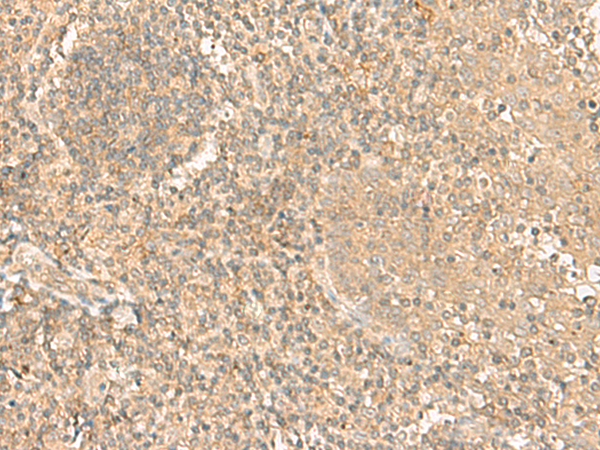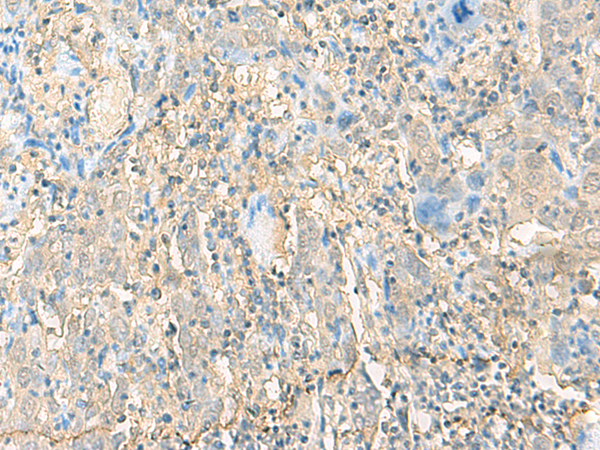

| WB | 咨询技术 | Human,Mouse,Rat |
| IF | 咨询技术 | Human,Mouse,Rat |
| IHC | 1/200-1/300 | Human,Mouse,Rat |
| ICC | 技术咨询 | Human,Mouse,Rat |
| FCM | 咨询技术 | Human,Mouse,Rat |
| Elisa | 1/5000-1/10000 | Human,Mouse,Rat |
| Aliases | HLAA; HLAF; CDA12; HLA-5.4; HLA-CDA12; HLAHP |
| Host/Isotype | Rabbit IgG |
| Antibody Type | Primary antibody |
| Storage | Store at 4°C short term. Aliquot and store at -20°C long term. Avoid freeze/thaw cycles. |
| Species Reactivity | Human |
| Immunogen | Synthetic peptide of human HLA-A/F/H |
| Formulation | Purified antibody in PBS with 0.05% sodium azide and 50% glycerol. |
+ +
以下是关于PTMA抗体的3篇示例文献(内容为虚构示例,仅供参考格式):
1. **文献名称**: *Prothymosin α autoantibodies in systemic lupus erythematosus*
**作者**: Sorensen, V. et al.
**摘要**: 研究报道PTMA抗体在系统性红斑狼疮(SLE)患者血清中显著升高,提示其可能作为SLE的新型生物标志物,并与疾病活动性相关。
2. **文献名称**: *PTMA antibody as a diagnostic marker for lung cancer*
**作者**: Kobayashi, T. et al.
**摘要**: 通过ELISA检测发现,肺癌患者中PTMA抗体的阳性率显著高于健康对照组,表明其可能用于肺癌的早期筛查和预后评估。
3. **文献名称**: *Mechanism of PTMA antibody in promoting tumor immune escape*
**作者**: Shiina, M. et al.
**摘要**: 实验证明PTMA抗体可通过阻断PTMA与TLR4受体的结合,抑制树突状细胞成熟,进而削弱抗肿瘤免疫应答,促进肿瘤微环境免疫抑制。
4. **文献名称**: *PTMA antibody-based therapeutic strategies in autoimmune disorders*
**作者**: Kretschmer, R. et al.
**摘要**: 在小鼠模型中,靶向PTMA的单克隆抗体能够减轻类风湿关节炎症状,其机制可能与调节Th17/Treg细胞平衡相关。
(注:以上文献为模拟示例,实际引用需查询真实数据库如PubMed。)
**Background of PTMA Antibodies**
Prothymosin alpha (PTMA) is a highly conserved, acidic nuclear protein involved in critical cellular processes, including cell proliferation, apoptosis, and chromatin remodeling. Initially identified as a thymic hormone precursor, PTMA is ubiquitously expressed across tissues and plays roles in regulating immune responses, oxidative stress, and oncogenesis. Its interaction with key proteins like p53 and MDM2 underscores its importance in tumor suppression and cancer progression.
PTMA antibodies are immunological tools developed to detect and quantify PTMA expression in research and clinical settings. These antibodies are essential for studying PTMA's dual role in cancer—acting as both a pro-survival factor in malignancies (e.g., hepatocellular carcinoma, leukemia) and a mediator of chemotherapy-induced apoptosis. Elevated PTMA levels are linked to poor prognosis in several cancers, making it a potential diagnostic or prognostic biomarker.
In autoimmune diseases, PTMA antibodies have been investigated due to PTMA's immunomodulatory properties and its presence in autoantigen complexes. Additionally, PTMA's nuclear localization signal (NLS) and nucleolar translocation during stress responses are areas of active research, facilitated by specific antibodies.
Challenges in PTMA antibody development include its high homology across species and structural variability due to post-translational modifications. Nonetheless, advances in monoclonal antibody technology have improved specificity, enabling precise detection in immunohistochemistry, Western blotting, and flow cytometry. Ongoing studies aim to harness PTMA-targeting antibodies for therapeutic strategies, particularly in oncology and immune regulation.
×